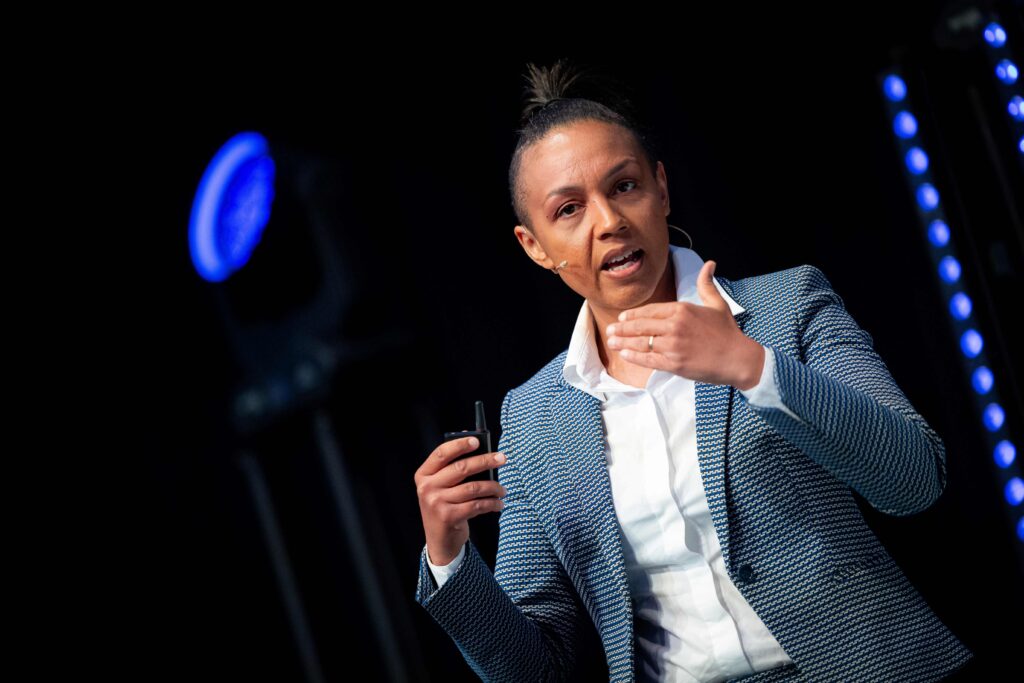It’s time for Europe to move on AI
At InnoHive 2025, futurist and AI strategist Raya White kicked things off with a memorable speech that cut through much of the jargon and hype around artificial intelligence (AI) to lay out an urgent call to action for European industry. “Let’s be blunt,” she said to a room full of policymakers, industrial leaders and technology innovators. “The biggest risk right now isn’t AI. It’s the hesitation that’s in this room to use it.”
White’s message was both clear and challenging: Europe must overcome its cautious, often bureaucratic approach to AI or risk being sidelined in the global economy. “The AI conversation is happening between the US and China,” she warned. “Europe? Too often, it’s watching from the sidelines.”
The biggest risk right now isn’t AI. It’s the hesitation that’s in this room to use it.
Raya White, futurist and AI strategist
A wake-up call
Unlike many AI evangelists, White’s talk wasn’t about speculative futures – it was grounded in tangible examples and industrial pragmatism. She pointed to Haier, the Chinese manufacturing giant, as a company that’s leveraged AI not just to improve logistics planning – cutting a four-hour weekly task to a single click – but also to empower its workers. “It meant staff could go home on time, not stay up late wrangling Excel,” White explained. “That’s a human outcome, not just a technical win.”
Back in Europe, she highlighted the example of Solvay, which has repurposed its 76-year-old facility in La Rochelle into a rare earth magnet plant. The move, which is part of the EU’s broader effort to secure strategic autonomy, signals that the continent can lead in AI and industry, but only if bold decisions are made.
“Reserves are not access. And supply is not sovereignty,” White said, emphasising the geopolitics of AI supply chains. “Solvay’s transformation isn’t a white paper. It’s not a pilot. It’s a full industrial pivot.”

Raya White, futurist and AI strategist, giving a keynote speech at InnoHive 2025. Photo credit (c) Xavier Lejeune
Throughout her address, White stressed the need for coordinated, continental action – linking AI implementation with resource strategy, education and industrial investment. She applauded initiatives from EIT Manufacturing, which supports industry-wide AI integration and skills development across Europe’s manufacturing base.
“We need these complementary moves,” she urged. “Not just software, but hardware. Not just policy, but plants. EIT Manufacturing is pushing for it and that matters. Because leadership without infrastructure? That’s just talk.”
Crucially, White tackled head-on the fear that AI will replace human workers. “AI is not here to take your job,” she said. “It’s here to take your repetitive tasks, to give you better tools and to give you your time back.”
She cited Tata Steel as a prime example. Facing pressure from low margins and high energy costs, the company trained more than 200 internal employees – engineers, technicians, managers – to run AI pilots that eventually saved the firm EUR 50 million annually.
“Who knows steel better than the people who already work with it every day?” White asked. “AI didn’t replace them. It empowered them.”
The case studies kept coming. At Schaeffler, a German manufacturer, AI-powered predictive maintenance and augmented reality (AR) glasses have enabled remote support and global knowledge transfer, halving service costs. At Mercedes-Benz, a legacy Berlin plant was turned into a “Digital Factory Campus,” using robots, AI chatbots and digital twins not to eliminate jobs, but to orchestrate smarter workflows.
The future of manufacturing isn’t machines replacing humans, it’s humans directing machines. It’s orchestration, not automation.
Raya White, futurist and AI strategist
White repeatedly returned to the need for a mindset change. “Most companies are waiting,” she said. “Waiting for the tech to be perfect, for the board to approve, or for someone else to go first. But the future isn’t built by people who wait. It’s built by people who move.”
In a nod to European perfectionism, she quoted the French proverb, “Perfection is the enemy of the good.” The core of her message: act now. Run pilots. Start small. Learn by doing. “The winners aren’t the believers,” she insisted. “They’re the experimenters.”
The final challenge: clarity, courage, action
As her keynote closed, White made a final appeal – not to the machines of tomorrow, but to the minds in the room. “AI doesn’t start with tech,” she said. “It starts with clarity. Then courage and then action.” Europe, she argued, still has the chance to lead in AI-powered manufacturing. The skills exist, the infrastructure is within reach and the people are ready. “But we must move. Or we will be moved.”

